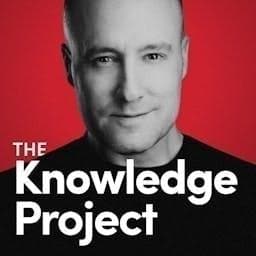Artificial Intelligence Podcast
Key Takeaways - The soul is the battleground between the forces of good and evil; it is your moral duty to constrain evil within yourself
- Communism does not scale and it does not iterate – whereas religious thought is the record of those ideas that have scaled and iterated
- If you follow the voice of adventure and make the necessary sacrifices to follow the path that takes you out of your comfort zone, then you will experience the following benefits:
- Your life will be a blessing
- Everyone will hold you in high esteem
- You will establish something of permanent value
- You will do these things in a way that is maximally beneficial to everyone else
- There is no distinction between the truest adventure of life and taking on the maximal responsibility and burden
- Compare yourself to who you were yesterday, not to who someone else is today
- Make the presumption that if you move forward in good faith, whatever happens to you will be the best thing that could happen – no matter what it is
- Men should have a temper, but they should be able to regulate it; most of what passes for morality is nothing but cowardice
- A good man has to be formidable: The capacity that could be the most potent force for evil can also be the most powerful force for good
- Welcome the adversity of life as a redemptive challenge; the best parts of yourself activate when you voluntarily contend with challenges
- After you go through a period of pain, you will have more gratitude for the ordinariness of life
- We have an existential moral duty to aim upward and to tell the truth
Read the full notes @ podcastnotes.org
Jordan Peterson is a psychologist, author, lecturer, and podcast host.
Thank you for listening ❤ Check out our sponsors: https://lexfridman.com/sponsors/ep448-sc
See below for timestamps, transcript, and to give feedback, submit questions, contact Lex, etc.
https://lexfridman.com/jordan-peterson-2-transcript
Feedback - give feedback to Lex: https://lexfridman.com/survey
AMA - submit questions, videos or call-in: https://lexfridman.com/ama
Hiring - join our team: https://lexfridman.com/hiring
Other - other ways to get in touch: https://lexfridman.com/contact
Peterson Academy: https://petersonacademy.com
Jordan's X: https://x.com/jordanbpeterson
Jordan's YouTube: https://www.youtube.com/@JordanBPeterson
Jordan's Website: https://jordanbpeterson.com
We Who Wrestle with God: https://amzn.to/485Dz4a
Beyond Order: https://amzn.to/3T4LRBw
12 Rules for Life: https://amzn.to/3c4sqYF
Maps of Meaning: https://amzn.to/3A1Ods2
To support this podcast, check out our sponsors & get discounts:
Eight Sleep: Temp-controlled smart mattress.
Go to https://eightsleep.com/lex
Ground News: Unbiased news source.
Go to https://groundnews.com/lex
BetterHelp: Online therapy and counseling.
Go to https://betterhelp.com/lex
LMNT: Zero-sugar electrolyte drink mix.
Go to https://drinkLMNT.com/lex
(00:00) - Introduction
(07:07) - Nietzsche
(14:48) - Power and propaganda
(19:54) - Nazism
(24:54) - Religion
(41:18) - Communism
(47:03) - Hero myth
(49:12) - Belief in God
(59:24) - Advice for young people
(1:12:02) - Sex
(1:32:00) - Good and evil
(1:44:46) - Psychopathy
(1:58:15) - Hardship
(2:10:31) - Pain and gratitude
- Podcast Website: https://lexfridman.com/podcast
- Apple Podcasts: https://apple.co/2lwqZIr
- Spotify: https://spoti.fi/2nEwCF8
- RSS: https://lexfridman.com/feed/podcast/
- Podcast Playlist: https://www.youtube.com/playlist?list=PLrAXtmErZgOdP_8GztsuKi9nrraNbKKp4
- Clips Channel: https://www.youtube.com/lexclips




































